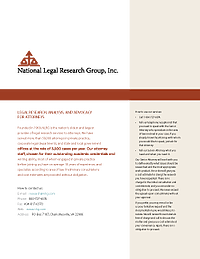Internet Acceptable Use Policies for Law Firms and Other Employers

Business use of the Internet has experienced extraordinary growth in recent years. It is now commonplace for employees to have access to the Internet, and as the United States moves ever closer to an information worker/service type of economy, even more employees will need access to the Internet to do their job effectively. Although the business uses of the Internet are many, much of the information available to employees on the Internet is not related to job performance. Thus, many employers have recognized that unrestricted use of the Internet by employees has the potential to drain, rather than enhance, productivity. The solution may be to implement a policy outlining the permissible parameters of employee Internet use, or an Internet acceptable use policy ("IAUP").
Attention Law Offices: Law firms and law offices should also have IAUPs that not only address the issues applicable to all employers but also have provisions relating to ethical concerns and protection of confidential information.
An IAUP is a written agreement, signed by employees, THAT sets out the permissible workplace uses of the Internet. In addition to describing permissible uses, an IAUP should specifically describe prohibited uses, rules of online behavior, and access privileges. Penalties for violations of the policy, including security violations and vandalism of the system, should also be covered. Anyone using a company's Internet connection should be required to sign an IAUP and know that it will be kept on file as a legal, binding document.
There are many reasons an employer may want to institute an IAUP. The Internet can be a magnificent source of detailed, current information that can enhance employee productivity. The Internet also allows access to a vast amount of purely entertainment-related features. Thus, in a very real sense, providing access to the Internet carries with it the same potential for productivity drain as placing a television on every employee's desk. It is not surprising, then, that loss of productivity is the number one reason for drafting an IAUP.
Another reason to institute an IAUP is to shield the employer from possible sexual harassment suits. As in most communications media, some of the pictures, video, sound, and text on the Internet is sexually oriented. If such material is brought into the workplace, it carries with it the potential to create a hostile work environment, thereby presenting a potential risk of exposure to the employer under federal or state prohibitions against sex discrimination.
There are also technological reasons to support the implementation of an IAUP. For example, restricting use of the Internet to only work-related matters serves to prevent a drain on limited computer resources caused by frivolous use. Access to the Internet costs a business money, either in fees to Internet Service Providers or in hardware costs necessary to accommodate increased network traffic and data storage. An employee's inappropriate use may negatively affect other employees' speed of access or storage space for work product. An IAUP can guide employees concerning the use of storage space and bandwidth on the system in order to maximize utility to all employees. Examples of restrictions serving this interest would be directives against downloading games or other non-work-related files OR downloading large files that can be obtained offline. An IAUP can also provide instructions on moving old or seldom-used files, programs, or e-mail to alternative storage.
Employers who have sensitive data on their computer system, be they company plans, customer demographic data, or product designs, may need a clause in their IAUP concerning trade secrets. It should be made clear to employees that under no circumstances should proprietary company information be passed through the Internet, or, if it is transmitted, that it be encrypted.
Finally, employers should institute guidelines which prohibit illegal use of the Internet in general. A directive that employees take care not to violate copyright laws should be included in every IAUP. Gambling via the Internet may also be a concern, and an IAUP should contain a prohibition against such activity not only because of its potentially adverse affect on productivity but also because the activity may be illegal.
Prepared by John F. Buckley, head of National Legal Research Group's Human Resources Division, this White Paper explains why employers need an IAUP and what it should contain, and provides a sample IAUP. The cost for either the standard employer or the law firm White Paper is $50.

